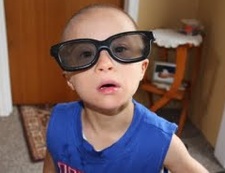27 Nov A “cure” for Down syndrome? — Reader feedback #6
 This thread (starting here and here) questioning efforts to “cure” Down syndrome began with a quick email from Jenn Power, community leader at L’Arche Cape Breton, mother of identical twins with Down syndrome, and—disclosure—Contrarian‘s daughter-in-law.
This thread (starting here and here) questioning efforts to “cure” Down syndrome began with a quick email from Jenn Power, community leader at L’Arche Cape Breton, mother of identical twins with Down syndrome, and—disclosure—Contrarian‘s daughter-in-law.
At Contrarian’s request, she has elaborated:
In the end, for me, this all comes back to people. Josh, Jacob, Mary, Cathy, Kate, Janet…these people have Down Syndrome. These people are my family, my friends, my teachers. Without the benefit of that extra chromosome, they would not be who they are. Their intellectual “impairment” gives them an insight and an emotional intelligence and maturity that I can only aspire to. They do not need a needle in their brain to make them more functional, to help them find their car keys. What they need is a society that values what they have to offer. I would like to think that I can be a part of creating that society
Full post after the jump.
As you know, I have many years of history supporting people with intellectual disabilities. Through my connections with these remarkable people, both personal and professional, I have become more and more convinced of the fundamental human dignity present in each person, the vital importance of diversity among the human race, and the particular and irreplaceable role that folks with intellectual disabilities play in creating a more humane, compassionate, and hospitable society. It is clear to me that, as a society, we need what people with intellectual disabilities have to offer.
Before we welcomed Josh and Jacob into our family, I might have had a much easier time responding to this particular piece of research. But as a mother of two little boys with Down Syndrome, boys whose identity, personality, appearance, is linked to that extra chromosome, my ability to rationally argue my point is seriously compromised. I find it hard to read this article without hearing a judgment on the value of my children, children who have transformed my life and the lives of many others – for the better – with the help of an extra chromosome.
In the debate surrounding disability – prenatal screening , euthanasia, etc. – there is an assumption that we all agree on a definition of what is good, what is better, what is the ideal. Who decided that smarter is better? Who decided that independence takes precedence over community? Who decided that both the individual and the society are better off without Down Syndrome? I would assert that something important is lost as our genetic diversity diminishes.
I would also assert that people with disabilities may not themselves choose to be “cured”. Bioethicist and disability activist Gregor Wolbring, who happens to have no legs as a result of the effects of thalidomide, asserts that, if given the choice, he would want to remain “disabled.” He feels it gives him an evolutionary advantage, even, as it allows him to weed out the “jerks” who treat him differently as a result of his disability. He poses the compelling question, “What exactly is the problem? Is the problem that I have no legs, or is the problem that I live in a leg-dominated society?” Similarly, what exactly is the problem with Down Syndrome? Is the problem that my boys have a low IQ, or that they live in an IQ dominated society?
I believe that our lives are lived not only for ourselves, but for others. My experience with people with intellectual disabilities is that their lives enrich the lives of others, and of the world around them, in significant and irreplaceable ways. I see this everyday in the school where my boys are in Grade Primary. I see how their presence brings out compassion, kindness, even tenderness, in the older kids at the school. How much money do we pour into anti-bullying strategies? Why do we not see the important ways that kids with disabilities help to reduce bullying in schools?
In my position as a member of a L’Arche community, I hear over and over how the witness of our people with intellectual disabilities, and the relationships they have with those of us who support them, enrich the lives of the people around us. People speak- often with eyes filled with tears – of how our people help them understand truth, hospitality, and freedom. American disability activist John MacKnight can give example after concrete example of how people with intellectual disabilities have enhanced the efficiency of hospital communication, improved performance of local symphony orchestras, even lowered the crime rate in major American cities.
In the end, for me, this all comes back to people. Josh, Jacob, Mary, Cathy, Kate, Janet…these people have Down syndrome. These people are my family, my friends, my teachers. Without the benefit of that extra chromosome, they would not be who they are. Their intellectual “impairment” gives them an insight and an emotional intelligence and maturity that I can only aspire to. They do not need a needle in their brain to make them more functional, to help them find their car keys. What they need is a society that values what they have to offer. I would like to think that I can be a part of creating that society
